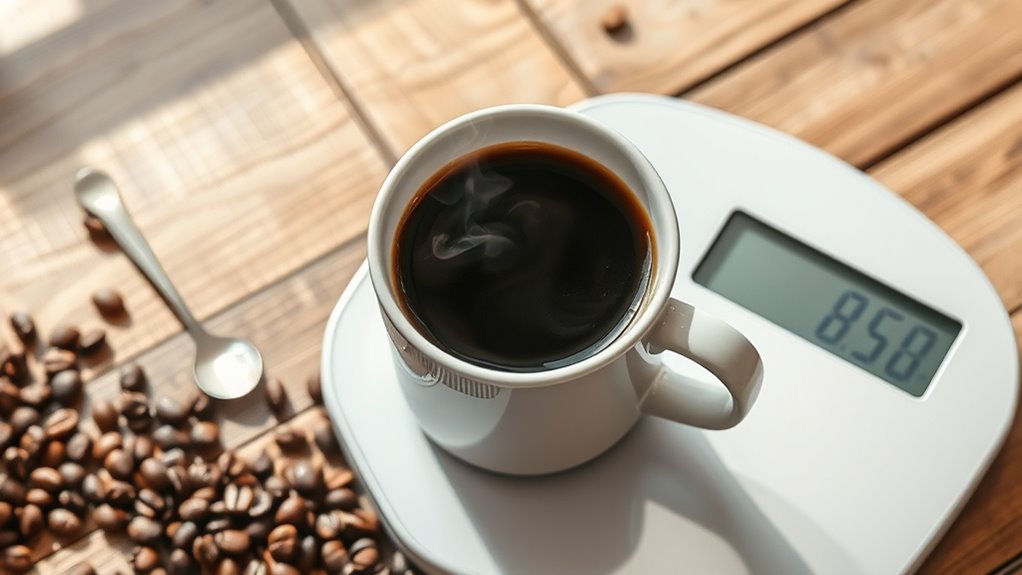Many coffee myths are just misconceptions. You won’t stunt your growth, as studies show caffeine doesn’t affect height and your genetics matter more. Coffee isn’t dehydrating; it helps contribute to your fluid intake, and moderate drinking isn’t linked to heart disease or high blood pressure. While caffeine can boost metabolism and help with weight loss, it might trigger anxiety in sensitive people or cause jitters if overdone. Decaf isn’t completely caffeine-free, so learn how to enjoy it wisely. Keep exploring these truths to fully understand coffee’s real effects.
Key Takeaways
- Moderate coffee consumption does not stunt growth or cause dehydration; it can be part of a balanced diet.
- Coffee’s temporary rise in blood pressure and antioxidant properties do not significantly increase heart disease risk.
- Caffeine boosts metabolism and appetite control, aiding weight management when combined with healthy habits.
- Individual sensitivity varies; limiting caffeine later in the day helps reduce anxiety, jitters, and sleep disruption.
- Decaffeinated coffee contains small amounts of caffeine; it’s not completely caffeine-free, and effects depend on personal sensitivity.
Does Coffee Really Stunt Your Growth?

Many people wonder if drinking coffee can stunt their growth, especially during your teenage years. Concerns about growth and childhood development often lead to questions about caffeine’s effects. The truth is, current research shows no direct link between coffee consumption and reduced height. Your growth depends mainly on genetics, nutrition, and overall health. While high caffeine intake might interfere with sleep, which is vital for growth, moderate coffee drinking isn’t proven to hinder your development. It’s a common myth that caffeine causes stunted growth, but scientific studies haven’t supported this claim. If you’re worried about growth concerns, focus on maintaining a balanced diet and getting enough rest. Coffee, in moderation, isn’t likely to impact your childhood development or final adult height. Additionally, understanding the features of smart toilets can be useful for promoting overall health and hygiene.
Is Coffee Dehydrating or Hydrating?

Many believe coffee dehydrates you, but understanding hydration levels shows it can contribute to your fluid intake. While caffeine has a diuretic effect, it usually doesn’t offset the water you consume. Additionally, recent research indicates that moderate coffee intake does not significantly increase dehydration risk AI security vulnerabilities, as the body adapts to caffeine’s effects over time. This adaptation process is linked to hydration balance, which helps maintain proper fluid levels despite caffeine consumption. Let’s explore how coffee truly impacts your hydration.
Hydration Levels Explained
While coffee is often thought of as a diuretic that dehydrates your body, recent research suggests its effects on hydration are more nuanced. When you consume coffee, it contributes to your overall fluid intake, helping maintain fluid balance. Although caffeine can influence electrolyte balance, your body adapts quickly, minimizing dehydration risks. Studies show that moderate coffee consumption doesn’t substantially impact hydration status, especially if you drink water throughout the day. Your body’s ability to manage fluid levels ensures that the diuretic effects are countered by the fluid intake from coffee itself. Additionally, understanding the role of contrast ratio in visual clarity can help you appreciate how image quality impacts your overall viewing experience. Moreover, the integration of hydration principles from recent studies emphasizes that balancing coffee with water intake is essential for maintaining proper hydration levels, highlighting the importance of protective styling benefits in maintaining healthy hair hydration.
Caffeine’s Diuretic Effect
Although caffeine is known for its diuretic properties, its effect on hydration isn’t as straightforward as once believed. While it can increase urinary effects, regular coffee drinkers often develop a tolerance that diminishes this impact. This means that moderate caffeine intake may not markedly disrupt your fluid balance. In fact, coffee can contribute to your daily hydration needs. Keep in mind that:
- The diuretic effect is less pronounced in habitual consumers
- Hydration depends on total fluid intake, not just coffee
- Small to moderate amounts generally won’t cause dehydration
- Overconsumption can still lead to fluid imbalance
- The protective effect of habitual caffeine consumption may further reduce dehydration risk
- The hydration contribution of coffee is supported by research indicating it can be part of your overall fluid intake
- Additionally, understanding caffeine’s effects helps clarify misconceptions about dehydration from coffee consumption
- Moreover, the tolerance development to caffeine’s diuretic effects underscores the importance of considering individual consumption patterns
- Studies have shown that the overall fluid intake from coffee and other beverages can offset any potential dehydration, emphasizing the importance of balanced consumption
Understanding these nuances helps you see that coffee isn’t necessarily dehydrating, especially when consumed in moderation within your overall fluid intake.
Does Coffee Cause Heart Disease or High Blood Pressure?

Concerns about coffee’s impact on heart health persist, but research shows the relationship isn’t as straightforward as once believed. Moderate coffee consumption isn’t linked to increased risk of heart disease for most people. In fact, some studies suggest it may even offer protective benefits. While caffeine can temporarily raise blood pressure, this spike is usually small and short-lived, especially for regular drinkers who build tolerance. For most individuals, coffee doesn’t markedly harm heart health or elevate blood pressure in the long term. Additionally, lifestyle factors such as diet, exercise, and stress levels play a significant role in heart health beyond just coffee intake. Regular coffee consumption has also been associated with antioxidant benefits that support overall cardiovascular health. Moreover, studies indicate that moderate coffee intake may improve endothelial function, which is beneficial for blood vessel health. Coffee’s anti-inflammatory properties may also contribute to its potential cardiovascular benefits. Recent research suggests that coffee might positively influence blood vessel elasticity, further supporting heart health. However, if you already have high blood pressure or heart issues, it’s wise to monitor your intake and consult your doctor. Overall, coffee isn’t an automatic risk factor; your heart health depends on many lifestyle factors beyond just your morning brew.
Can Coffee Help You Lose Weight?

Many people turn to coffee as a quick boost to support their weight loss efforts. Coffee’s caffeine content can provide a metabolic boost, helping your body burn calories more efficiently. It also offers appetite suppression, making it easier to resist cravings. Additionally, the hydrocolloid technology used in some patches can help absorb impurities more effectively, which is similar to how caffeine stimulates your central nervous system to enhance activity. This dual action can contribute to better overall metabolic health. However, coffee alone won’t melt away pounds; it’s a helpful tool when combined with a healthy diet and exercise. Keep in mind:
- Caffeine stimulates your central nervous system
- It temporarily increases calorie burn
- It reduces feelings of hunger
- Over-reliance can lead to tolerance and decreased effectiveness
- Using coffee as part of a balanced approach can optimize your weight management results
While coffee can support weight loss, it’s not a magic solution. Use it strategically to enhance your efforts, but focus on overall lifestyle changes for long-term results.
Does Coffee Lead to Increased Anxiety and Nervousness?

You might wonder if coffee makes you more anxious or nervous. Caffeine can influence anxiety levels, but the effects vary depending on how much you consume. Your individual sensitivity also plays a big role in how coffee impacts your mood and nerves. Additionally, for those interested in vehicle customization, Kia Tuning offers various modifications that can enhance performance and aesthetics, but they should be approached carefully to avoid unintended effects on the vehicle’s reliability or safety. Understanding credit card terms is essential for managing personal finances effectively, especially when considering the costs associated with coffee or vehicle upgrades. Moreover, AI-driven personalization in e-learning demonstrates how tailored experiences can improve engagement and outcomes, similar to how individuals respond differently to caffeine. Developing an awareness of industry trends can help consumers make informed decisions about their caffeine intake and related lifestyle choices. Recognizing the importance of local insights can also help new residents better navigate and adapt to their environments, reducing anxiety related to change.
Caffeine’s Impact on Anxiety
While coffee is often associated with increased alertness, its caffeine content can sometimes trigger feelings of anxiety and nervousness in sensitive individuals. If you consume too much or experience caffeine withdrawal, you might notice heightened anxiety or jitters. Additionally, caffeine can cause sleep disruption, which worsens anxiety symptoms. To minimize these effects, consider:
- Limiting intake later in the day
- Reducing overall caffeine consumption
- Avoiding caffeine if you’re prone to anxiety
- Recognizing signs of caffeine withdrawal, like irritability or fatigue
Understanding your body’s response helps you manage caffeine’s impact. Remember, while moderate coffee intake may not cause issues, excessive or late-day consumption can amplify anxiety symptoms. Staying mindful of your caffeine habits supports better mental well-being. Being aware of caffeine’s effects on sleep quality can further help in managing anxiety levels effectively. Also, incorporating calming practices such as essential oils for relaxation might help mitigate some anxiety symptoms associated with caffeine intake.
Moderate Consumption Benefits
Research suggests that moderate coffee consumption can provide benefits without substantially increasing anxiety or nervousness. When you keep your intake within recommended limits, you can enjoy health benefits like improved focus, mood, and alertness. A moderate intake generally means about 3-4 cups daily, which balances energy boosts without overloading your system. Visualize this balance with the following:
| Moderate Coffee Intake | Physical Effects | Mental Benefits |
|---|---|---|
| 3-4 cups/day | Steady energy, no jitters | Enhanced concentration |
| No nervousness | Improved mood | Better alertness |
| Health benefits | Reduced risk of some diseases | Focused mental clarity |
Individual Sensitivity Factors
Individual sensitivity to coffee varies widely, meaning that some people may experience increased anxiety and nervousness even with moderate intake. Your genetic predisposition and metabolic differences play significant roles here. If you have a genetic predisposition, your body might process caffeine more slowly, leading to heightened effects. Conversely, some metabolize caffeine quickly, reducing side effects. Factors influencing sensitivity include:
- Genetic factors affecting caffeine metabolism
- Variations in neurotransmitter responses
- Personal history with anxiety or nervousness
- Overall health and stress levels
Understanding your unique response helps you manage intake better. If you notice increased jitters or anxiety after drinking coffee, consider adjusting your consumption or choosing decaffeinated options. Recognizing these individual differences can help you enjoy coffee without unwanted nervousness.
Is Decaffeinated Coffee Completely Caffeine-Free?

Is decaffeinated coffee truly free of caffeine? Many people have decaffeinated misconceptions, assuming it contains no caffeine at all. In reality, decaffeinated coffee isn’t completely caffeine-free; it has caffeine content variations depending on the brand and process used. On average, an 8-ounce cup of decaf has about 2 to 5 milligrams of caffeine, compared to 95 milligrams in regular coffee. The decaffeination process removes most caffeine but rarely eliminates it entirely. If you’re highly sensitive to caffeine, even small amounts can have an effect. So, while decaffeinated coffee is a good choice for reducing caffeine intake, it’s not a guaranteed caffeine-free beverage. Always check labels or ask your barista if you need to avoid caffeine completely.
Frequently Asked Questions
Does Coffee Affect Bone Density Over Long-Term Consumption?
You might wonder if long-term coffee drinking impacts your bones. While high caffeine intake can slightly decrease calcium absorption, moderate coffee consumption usually doesn’t harm bone mineralization. It’s important to balance your diet with calcium-rich foods and limit excessive caffeine to support healthy bones. If you’re concerned, consider consulting a healthcare professional to make sure your coffee habits don’t compromise your bone density over time.
Can Coffee Consumption Improve Mental Alertness in Older Adults?
You might notice that coffee can boost mental alertness, especially in older adults. It provides a quick cognitive enhancement by stimulating your central nervous system, which can help counteract age-related decline in mental functions. Regular moderate coffee consumption may support sharper focus and improved memory, making it a useful tool to maintain cognitive health as you age. Just remember to enjoy it in moderation to avoid negative effects.
Is There a Link Between Coffee and Cancer Risk?
Think of coffee as a double-edged sword, where each sip could tip the scale. Research shows no clear link between coffee and increased cancer risk, but your genetic predisposition and environmental factors play roles. You’re not powerless—by understanding your genetics and lifestyle, you can enjoy coffee without undue concern. It’s about balancing the joy of your brew with awareness of your unique health landscape.
How Does Brewing Method Influence Coffee’s Health Effects?
Your brewing method impacts coffee’s health effects through factors like brew strength and water temperature. A stronger brew or higher water temperature can increase the extraction of beneficial antioxidants but may also release more cafestol, which can raise cholesterol. To maximize health benefits, use moderate brew strength and ideal water temperature, avoiding overly hot water that might degrade compounds. Adjust your brewing process to balance flavor and health advantages.
Does Adding Sugar or Cream Negate Coffee’s Health Benefits?
Did you know that adding sugar or cream can alter coffee’s health benefits? While a teaspoon of sugar impacts blood sugar levels, it doesn’t erase coffee’s antioxidants. Cream effects vary—small amounts add flavor, but excessive use can increase calories and fats. So, moderation is key. You get to enjoy coffee’s benefits without negating them when you balance added sugar and cream with your overall diet.
Conclusion
Now that you’ve separated fact from fiction, you can enjoy your coffee smarter. Remember, moderation is key—think of it as your trusty sidekick, like Robin to Batman. Whether it’s boosting your mood or fueling your day, knowing the truths helps you make better choices. So, sip confidently, and don’t let old tales from the days of chivalry cloud your judgment. Cheers to a well-informed coffee journey—your secret weapon in today’s fast-paced world!









